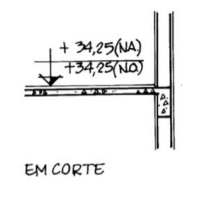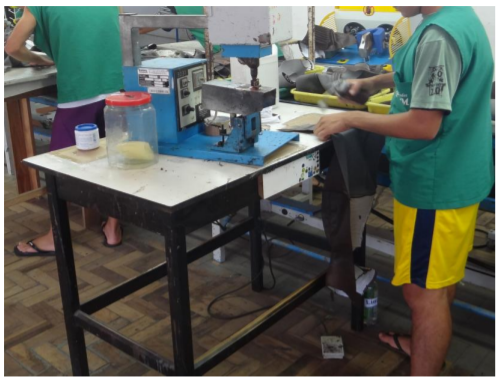Questões de Concurso
Para prefeitura de alpestre - rs
Foram encontradas 418 questões
Resolva questões gratuitamente!
Junte-se a mais de 4 milhões de concurseiros!
A questão refere-se ao texto. Os destaques ao longo do texto estão citados na questão.
Os estágios curriculares obrigatórios: aprender a ser professor é responsabilidade de todos.
Por Roberta Flaborea Favero

(Disponível em: https://revistaeducacao.com.br/2020/01/31/estagios-obrigatorios-professor/ -
Texto especialmente adaptado para esta prova.)
( ) O ponto de interrogação, na linha 13, introduz uma pergunta direta, porém sem um interlocutor definido.
( ) O uso das aspas, na linha 13, indica realce das palavras empregadas pelo autor.
( ) O travessão, na linha 18, introduz uma fala em discurso direto.
A ordem correta de preenchimento dos parênteses, de cima para baixo, é:
A questão refere-se ao texto. Os destaques ao longo do texto estão citados na questão.
Os estágios curriculares obrigatórios: aprender a ser professor é responsabilidade de todos.
Por Roberta Flaborea Favero

(Disponível em: https://revistaeducacao.com.br/2020/01/31/estagios-obrigatorios-professor/ -
Texto especialmente adaptado para esta prova.)
A questão refere-se ao texto. Os destaques ao longo do texto estão citados na questão.
Os estágios curriculares obrigatórios: aprender a ser professor é responsabilidade de todos.
Por Roberta Flaborea Favero

(Disponível em: https://revistaeducacao.com.br/2020/01/31/estagios-obrigatorios-professor/ -
Texto especialmente adaptado para esta prova.)
A questão refere-se ao texto. Os destaques ao longo do texto estão citados na questão.
Os estágios curriculares obrigatórios: aprender a ser professor é responsabilidade de todos.
Por Roberta Flaborea Favero

(Disponível em: https://revistaeducacao.com.br/2020/01/31/estagios-obrigatorios-professor/ -
Texto especialmente adaptado para esta prova.)
A questão refere-se ao texto. Os destaques ao longo do texto estão citados na questão.
Os estágios curriculares obrigatórios: aprender a ser professor é responsabilidade de todos.
Por Roberta Flaborea Favero

(Disponível em: https://revistaeducacao.com.br/2020/01/31/estagios-obrigatorios-professor/ -
Texto especialmente adaptado para esta prova.)
A questão refere-se ao texto. Os destaques ao longo do texto estão citados na questão.
Os estágios curriculares obrigatórios: aprender a ser professor é responsabilidade de todos.
Por Roberta Flaborea Favero

(Disponível em: https://revistaeducacao.com.br/2020/01/31/estagios-obrigatorios-professor/ -
Texto especialmente adaptado para esta prova.)
( ) Trata-se de substantivo abstrato e tem como sinônimo a palavra “medo”.
( ) O vocábulo destacado é uma paroxítona e possui duas sílabas.
( ) A grafia do verbo formado a partir dessa palavra é “receiar”.
A ordem correta de preenchimento dos parênteses, de cima para baixo, é:
A questão refere-se ao texto. Os destaques ao longo do texto estão citados na questão.
Os estágios curriculares obrigatórios: aprender a ser professor é responsabilidade de todos.
Por Roberta Flaborea Favero

(Disponível em: https://revistaeducacao.com.br/2020/01/31/estagios-obrigatorios-professor/ -
Texto especialmente adaptado para esta prova.)
A questão refere-se ao texto. Os destaques ao longo do texto estão citados na questão.
Os estágios curriculares obrigatórios: aprender a ser professor é responsabilidade de todos.
Por Roberta Flaborea Favero

(Disponível em: https://revistaeducacao.com.br/2020/01/31/estagios-obrigatorios-professor/ -
Texto especialmente adaptado para esta prova.)
A questão refere-se ao texto. Os destaques ao longo do texto estão citados na questão.
Os estágios curriculares obrigatórios: aprender a ser professor é responsabilidade de todos.
Por Roberta Flaborea Favero

(Disponível em: https://revistaeducacao.com.br/2020/01/31/estagios-obrigatorios-professor/ -
Texto especialmente adaptado para esta prova.)
A questão refere-se ao texto. Os destaques ao longo do texto estão citados na questão.
Os estágios curriculares obrigatórios: aprender a ser professor é responsabilidade de todos.
Por Roberta Flaborea Favero

(Disponível em: https://revistaeducacao.com.br/2020/01/31/estagios-obrigatorios-professor/ -
Texto especialmente adaptado para esta prova.)
I. Para o autor do texto, a avaliação, tanto do estudante quanto da instituição de ensino onde as práticas são realizadas é importante e construtiva.
II. Os coordenadores de escola têm um embasamento sólido sobre a necessidade da realização do estágio, mas é difícil que essa prática aconteça.
III. A prática do estágio traz benefícios tanto para o estudante quanto para os coordenadores e professores que os recebem.
Quais estão corretas?
No desenho abaixo, N.A. e N.O. representam respectivamente:

( ) Área de pavimento é medida em metros quadrados, em qualquer pavimento de uma edificação, do espaço compreendido pelo perímetro interno das paredes externas e paredes corta-fogo, incluindo a área de antecâmaras, e dos recintos fechados de escadas e rampas.
( ) Escada enclausurada à prova de fumaça (PF) é a escada cuja caixa é envolvida por paredes corta-fogo e dotada de portas corta-fogo, cujo acesso é por antecâmara igualmente enclausurada ou local aberto, de modo a evitar fogo e fumaça em caso de incêndio.
( ) Pavimento em pilotis é o local edificado de uso comum, aberto em pelo menos três lados, devendo os lados abertos ficar afastados, no mínimo, 1,00 m das divisas. Considera-se, também, como tal, o local coberto, aberto em pelo menos duas faces opostas, cujo perímetro aberto tenha, no mínimo, 50% do perímetro total.
( ) Varanda é a parte da edificação, não em balanço, limitada pela parede perimetral do edifício, tendo pelo menos uma das faces aberta para o logradouro ou área de ventilação.
A ordem correta de preenchimento dos parênteses, de cima para baixo, é:
( ) Desempenho é o comportamento em uso de uma edificação e de seus sistemas.
( ) Falha é a característica do estado-limite último, por ruptura ou por perda de estabilidade ou por deformação acima dos limites de estado limite último estabelecido em normas.
( ) Sistema é a maior parte funcional do edifício. Conjunto de elementos e componentes destinados a cumprir com uma macrofunção que a define (exemplo: fundação, estrutura, vedações verticais, instalações hidrossanitárias, cobertura).
( ) Transmitância térmica é a transmissão de calor em unidade de tempo e através de uma área unitária de um elemento ou componente construtivo; neste caso, dos vidros e dos componentes opacos das paredes externas e coberturas, incluindo as resistências superficiais interna e externa, induzida pela diferença de temperatura entre dois ambientes.
A ordem correta de preenchimento dos parênteses, de cima para baixo, é:
I. Alimentador predial é a tubulação que liga a fonte de abastecimento a um reservatório de água de uso doméstico. II. Registro de fechamento é um componente instalado na tubulação e destinado a interromper a passagem da água. Deve ser usado totalmente fechado ou totalmente aberto. III. Instalação primária de esgoto é o conjunto de tubulações e dispositivos em que não têm acesso os gases provenientes do coletor público ou dos dispositivos de tratamento.
Quais estão corretas?
I. A execução de qualquer edificação será precedida dos seguintes atos administrativos: Aprovação do Projeto e Licenciamento da Construção.
II. Independem de apresentação de projeto serviços de pintura em geral e construção de muros no alinhamento de logradouro, dentre outros.
III. O Alvará de Licença para início da construção será válido pelo prazo de seis meses. Findo este prazo e não tendo sido iniciada a construção, ele perderá o seu valor.
IV. Nos logradouros abertos por particulares com licença da Prefeitura assim como novos loteamentos, não é permitido aos interessados promover e custear a respectiva arborização.
Quais estão corretas?
